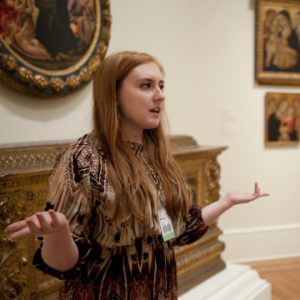
Lesson Concept: Why Look At Art?
Students practice engaging with art, making meaning from that interaction, and considering how art can connect us to people and ideas across time and place. Use this before a museum visit to set the stage for a rich in-gallery experience.
Why Look at Art?
Invite students to bring in or share a picture of a piece of artwork they have in their homes. It can be something from their personal collection or that of their family. As a class, in groups, or in pairs, ask students to:
Look Closely
Look closely at each object for at least 30 seconds and answer these simple questions:
- What do you see?
- What do you think about that?
- What does it make you wonder?
Compare responses to the owner’s ideas about each object.
Discuss
What you were able to glean about:
The Artist’s Ideas
- Why/how/when might he or she have made this art?
Cultural Context
- Where did this come from?
- Why might it have been chosen for that space and by whom?
- Who might interact with it?
Content/Meaning
- Does it seem to have a message or tell a story? What might that message be?
- Who are the characters in the story?
- Does it convey a feeling or mood?
Extend Your Thinking
As a collection, what did this art tell you about your group (class)? Consider:
- What ideas does the group share?
- What does the group value?
- What does the group have in common?
- How is the group diverse?
Reflect
Look at the art you brought to share with new eyes. Consider the class discussion and complete the following statements about your art:
I used to think…
Now I think…
Structure this simple activity in a way that makes sense for your class. Make a game of it, use written responses to augment discussion, frame it through the lens of your academic discipline, etc.